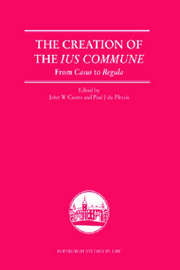Book contents
- Frontmatter
- Contents
- Preface
- List of Contributors
- List of Abbreviations
- Introduction
- 1 The Sources of Medieval Learned Law
- 2 The Infrastructure of the Early Ius Commune: The Formation of Regulae, or its Failure
- 3 Ius Quaerens Intellectum: The Method of the Medieval Civilians
- 4 Medieval Family and Marriage Law: From Actions of Status to Legal Doctrine
- 5 The Roman Concept of Ownership and the Medieval Doctrine of Dominium Utile
- 6 Succession to Fiefs: A Ius Commune Feudorum?
- 7 Towards the Medieval Law of Hypothec
- 8 The Ignorant Seller's Liability for Latent Defects: One Regula or Various Sets of Rules?
- 9 The Glossators' Monetary Law
- 10 Citations and the Construction of Procedural Law in the Ius Commune
- 11 Doctoribus bona dona danda sunt: Actions to Recover Unpaid Legal Fees
- Index
11 - Doctoribus bona dona danda sunt: Actions to Recover Unpaid Legal Fees
Published online by Cambridge University Press: 12 September 2012
- Frontmatter
- Contents
- Preface
- List of Contributors
- List of Abbreviations
- Introduction
- 1 The Sources of Medieval Learned Law
- 2 The Infrastructure of the Early Ius Commune: The Formation of Regulae, or its Failure
- 3 Ius Quaerens Intellectum: The Method of the Medieval Civilians
- 4 Medieval Family and Marriage Law: From Actions of Status to Legal Doctrine
- 5 The Roman Concept of Ownership and the Medieval Doctrine of Dominium Utile
- 6 Succession to Fiefs: A Ius Commune Feudorum?
- 7 Towards the Medieval Law of Hypothec
- 8 The Ignorant Seller's Liability for Latent Defects: One Regula or Various Sets of Rules?
- 9 The Glossators' Monetary Law
- 10 Citations and the Construction of Procedural Law in the Ius Commune
- 11 Doctoribus bona dona danda sunt: Actions to Recover Unpaid Legal Fees
- Index
Summary
ROMAN LAW
The idea that one must pay for legal advice and representation in order to secure one's rights has never had wide appeal, save to those equipped to provide these services – and even some of them have occasionally voiced reservations about the practice. “How glad I am that I have always kept clear of any contracts, presents, remunerations, or even small gifts for my conduct of cases”, wrote the younger Pliny (61/62-113). He added: “It is true that one ought to shun dishonesty as a shameful thing, not just because it is illegal; but, even so, it is a pleasure to find an official ban on a practice one would never have permitted oneself.”
This last remark refers, of course, to the Lex Cincia, a plebiscite of 204 bce, which forbade advocates to accept remuneration for pleading in the courts. Although the measure was apparently seldom enforced, Augustus (r 27 bce-14 ce) persuaded the Senate to re-enact the Lex Cincia and to bolster it with a fourfold penalty for violations. Enforcement remained lax, however, and Claudius (r 31-54 ce) yielded to arguments put to him by a group of senators who were also advocates. They insisted that it was only fair that they receive compensation for using their skill and knowledge on behalf of others. In response Claudius agreed to abrogate the earlier law and to permit advocates to receive remuneration, but only up to a maximum of 10,000 sesterces for each case.
- Type
- Chapter
- Information
- The Creation of the Ius CommuneFrom Casus to Regula, pp. 277 - 294Publisher: Edinburgh University PressPrint publication year: 2010



